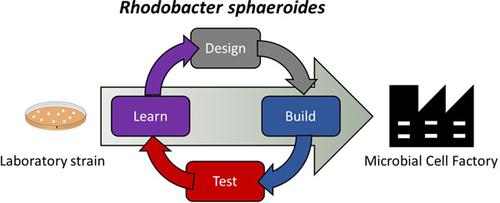当前位置:
X-MOL 学术
›
Biotechnol. Bioeng.
›
论文详情
Our official English website, www.x-mol.net, welcomes your feedback! (Note: you will need to create a separate account there.)
The transition of Rhodobacter sphaeroides into a microbial cell factory
Biotechnology and Bioengineering ( IF 3.8 ) Pub Date : 2020-10-10 , DOI: 10.1002/bit.27593 Enrico Orsi 1, 2 , Jules Beekwilder 3 , Gerrit Eggink 1, 4 , Servé W M Kengen 5 , Ruud A Weusthuis 1
Biotechnology and Bioengineering ( IF 3.8 ) Pub Date : 2020-10-10 , DOI: 10.1002/bit.27593 Enrico Orsi 1, 2 , Jules Beekwilder 3 , Gerrit Eggink 1, 4 , Servé W M Kengen 5 , Ruud A Weusthuis 1
Affiliation

|
Microbial cell factories are the workhorses of industrial biotechnology and improving their performances can significantly optimize industrial bioprocesses. Microbial strain engineering is often employed for increasing the competitiveness of bio‐based product synthesis over more classical petroleum‐based synthesis. Recently, efforts for strain optimization have been standardized within the iterative concept of “design‐build‐test‐learn” (DBTL). This approach has been successfully employed for the improvement of traditional cell factories like Escherichia coli and Saccharomyces cerevisiae. Within the past decade, several new‐to‐industry microorganisms have been investigated as novel cell factories, including the versatile α‐proteobacterium Rhodobacter sphaeroides. Despite its history as a laboratory strain for fundamental studies, there is a growing interest in this bacterium for its ability to synthesize relevant compounds for the bioeconomy, such as isoprenoids, poly‐β‐hydroxybutyrate, and hydrogen. In this study, we reflect on the reasons for establishing R. sphaeroides as a cell factory from the perspective of the DBTL concept. Moreover, we discuss current and future opportunities for extending the use of this microorganism for the bio‐based economy. We believe that applying the DBTL pipeline for R. sphaeroides will further strengthen its relevance as a microbial cell factory. Moreover, the proposed use of strain engineering via the DBTL approach may be extended to other microorganisms that have not been critically investigated yet for industrial applications.
中文翻译:

球形红杆菌向微生物细胞工厂的转变
微生物细胞工厂是工业生物技术的主力军,提高其性能可以显着优化工业生物过程。微生物菌株工程通常用于提高生物基产品合成相对于更经典的石油基合成的竞争力。最近,应变优化的努力已经在“设计-构建-测试-学习”(DBTL)的迭代概念中标准化。这种方法已成功用于改进传统的细胞工厂,如大肠杆菌和酿酒酵母。在过去的十年中,已经研究了几种新工业微生物作为新型细胞工厂,包括多功能α-变形杆菌球状红杆菌. 尽管它作为基础研究的实验室菌株的历史,但人们对这种细菌越来越感兴趣,因为它能够合成生物经济相关的化合物,如类异戊二烯、聚 β-羟基丁酸酯和氢。在本研究中,我们从 DBTL 概念的角度思考了将球状红球藻建立为细胞工厂的原因。此外,我们讨论了将这种微生物用于生物经济的当前和未来机会。我们相信将 DBTL 管道应用于R. sphaeroides将进一步加强其作为微生物细胞工厂的相关性。此外,通过 DBTL 方法对菌株工程的拟议使用可以扩展到尚未针对工业应用进行严格研究的其他微生物。
更新日期:2020-10-10
中文翻译:

球形红杆菌向微生物细胞工厂的转变
微生物细胞工厂是工业生物技术的主力军,提高其性能可以显着优化工业生物过程。微生物菌株工程通常用于提高生物基产品合成相对于更经典的石油基合成的竞争力。最近,应变优化的努力已经在“设计-构建-测试-学习”(DBTL)的迭代概念中标准化。这种方法已成功用于改进传统的细胞工厂,如大肠杆菌和酿酒酵母。在过去的十年中,已经研究了几种新工业微生物作为新型细胞工厂,包括多功能α-变形杆菌球状红杆菌. 尽管它作为基础研究的实验室菌株的历史,但人们对这种细菌越来越感兴趣,因为它能够合成生物经济相关的化合物,如类异戊二烯、聚 β-羟基丁酸酯和氢。在本研究中,我们从 DBTL 概念的角度思考了将球状红球藻建立为细胞工厂的原因。此外,我们讨论了将这种微生物用于生物经济的当前和未来机会。我们相信将 DBTL 管道应用于R. sphaeroides将进一步加强其作为微生物细胞工厂的相关性。此外,通过 DBTL 方法对菌株工程的拟议使用可以扩展到尚未针对工业应用进行严格研究的其他微生物。



























 京公网安备 11010802027423号
京公网安备 11010802027423号